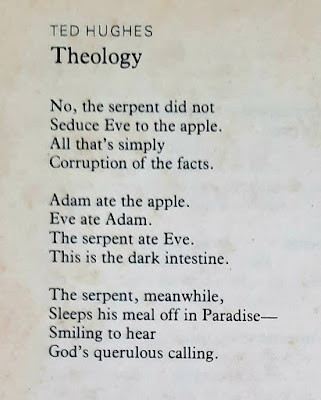Keeper of your brother
The
first real sin committed in the Bible is fratricide. Abel is killed by Cain.
The very first sin which Christianity celebrates as “the original sin”
(What’s original about it? James Joyce wondered) is not a sin but an assertion
of hegemony. The biblical God just wanted to ensure that He (not She;
women were as good as cattle for the Jewish man who created the Genesis myth)
was the Boss in Paradise. The biblical Paradise is a place where every creature
is a servile subject of God. The “original sin” was a challenge hurled
at that hegemony. The shrewd Jew who created that myth was ensuring that the
entire Jewish race would forever remain servile to the religious hierarchy. The
guy must have been a misogynist too. He put the primary blame for the “original
sin” on Eve rather than Adam.
So,
Eve eats the apple and then seduces Adam. The result is Cain. This guy Cain goes
on to kill his brother Abel just because God, with whom Cain has nothing to do
really, is happier with Abel’s offering of a lamb than Cain’s offering of
grains. Yahweh is bloodthirsty right from beginning. He sucked up the blood of
Abel’s lamb. Later, he demanded nothing less than the blood of Abraham’s son.
Just imagine. Abraham managed to get his wife Sara pregnant with much
difficulty at the age of 99 and he was a centenarian when his only son Isaac
was born. Now his God calls him and says, “Come on, Abe, I want your son’s
blood.” And there goes centenarian Abraham like a docile ass to fetch a knife
to slit the throat of his only son. That asinine docility is what every
religion demands. That murderous docility is the highest virtue in most
religions.
Cain
is different, however. He will offer a part of his income to Yahweh as a
ritual. Like many Christians going to church on Sundays or others going to
their respective temples. Ritual. Cain follows the ritual. But he has contempt
for his God who wants this sort of ego-enhancing rituals. His contempt is a
product of an ego that is not as gargantuan as Yahweh’s. This ego makes him
unhappy when Yahweh finds Abel’s servility more pleasing. “Why can’t you be man
enough to accept my manliness and stop being a beggar for attention?” Cain
seems to be asking that to Yahweh. What he does not understand is that Yahweh
does not want any other man than Himself. “I am the only Man. Thou shalt not
have any other man.” Yahweh is a macho megalomaniac. But Cain knows that he is
a man too.
The
clash is between Yahweh’s ego and Cain’s ego. The victim is innocent Abel. Even
God cannot prevent the death of that innocence. What an impotent God! His only
power is to question Cain. “Where is your brother Abel?” And Cain’s answer is: “Am
I my brother’s keeper?”
God
laughs. He loves Cain. Cain is fun. Abel was a big bore with his stupid
servility and idiotic innocence. That’s why Cain’s children multiplied in
geometric progression on the planet while Abel vanished like the morning mist. Cain’s
children screw each other at every bend in the street asking the same question:
“Am I my brother’s keeper?”
PS. I'm
participating in #BlogchatterA2Z
Previous
Post: Jacques
the Fatalist in Jaiaw
Tomorrow:
Loneliness can kill

I posted a comment just now - seems vanished. did u get ?
ReplyDeleteNo, I checked my dashboard too. There's no pending comment. Sorry to miss your opinion. Why not try once more?
DeleteYa some times blogs eat up comments!! I told i had to Google meaning of hegemony and fartricide to understand ur post better. New words for me...am not aware of biblical history but I think the gist means Cain the is multiplying on the planet and good ppl like Able dont last long!? Did I get it right. I was asking u the same
Delete....
You got it right, Afshan. I'm immensely happy that you take me seriously.
DeleteHari OM
ReplyDelete"This is the dark intestine."... seems Hughes had a grasp of the yuga - and even Genisis is demonstrating how those who composed it could see nothing but it! K=Kalu Yuga
... and it seems Afshan may be having some of the trouble I was having yesterday with comments... Google tinkering under the hood again! YAM xx
Maybe I should try changing the template. Many people tell me they find it difficult to post comments.
DeleteTed Hughes' poem has attracted diverse interpretations. This is my unorthodox interpretation.
The flavour of this post is tart. It does the job -- it calls a spade a spade. Courage and clarity--I've said it before-- I always find the two in your writing. Thank you for stating the obvious--not many people have the appetite for such truths these days.
ReplyDeleteThank you, Arti. I consider this appetite of mine for the spade a vice rather than virtue. It used to be worse in the olden days. I'm mellowing now. :)
DeleteContempt is the product of the ego is my take away from your post, Matheikel. Misogynism is also a product of ego, isnt it? Anything that is not in harmony with normal ways of life causes destruction and the root cause can be traced to ego. Ego is something like the serpent in the poem, one that will eat everything and leave no trace of existence, of life.
ReplyDeleteEgo is often the biggest hurdle in people's progress towards happiness and fulfilment. I too grappled with my ego for a long time. Once I shed it, I became a happy person. Not that one can shed the entire ego.
Delete